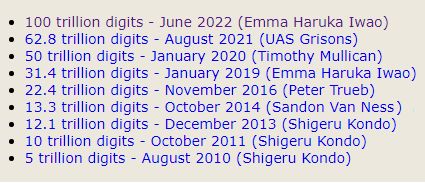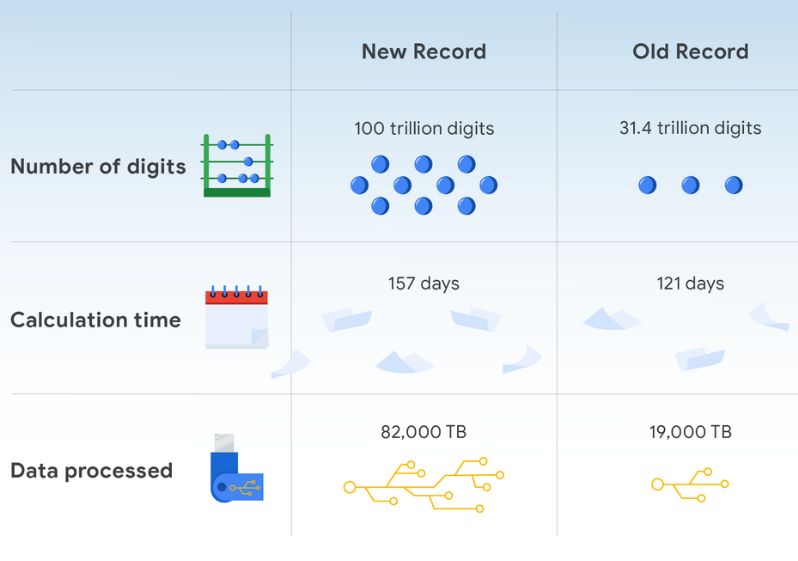| New Record From Google - 100 Trillion Digits Of Pi |
| Written by Sue Gee |
| Friday, 17 June 2022 |
|
Emma Haruka Iwao, a Developer Advocate at Google Cloud, started a calculation to compute pi to 100 Trillion digits on Google Cloud from her home office on October 14 2021. The task took until March 21, 2022 and led to the discovery that the 100-trillionth decimal place of pi is 0. If the sequence leading up to the 0 was read out loud at the rate of 1 digit per second, the feat would require 3.17 million years. The calculation required 82,000 terraabytes of data to be processed and its vital statistics are provided in this overview from the Google Cloud blog:
The y-cruncher algorithm, which originated in "a high-school project that went a little too far" and is described as: the first scalable multi-threaded Pi-benchmark for multi-core systems dates from 2009 and has been breaking records ever since. Back in August 2010 we reported on the algorithm's first breakthough when Alexander J. Yee & Shigeru Kondo computed pi to 5 trillion digits. What we found remarkable then was that this had been achieved using nothing but a desktop computer. It was a fairly upmarket machine for the time with 12 physical cores and 24 hyperthreads, 96GBytes of Ram and 40TByes of disk storage. The following year Shigeru Kondo doubled the number of digits, to 10 trillion and this latest record, which is in the process of being evaluated as a Guinness World Record, takes us to the next order of magnitude. This list of Pi milestones comes from the y-cruncher website: Emma Haruka Iwoa initially used y-cruncher when she first broke the digits of pi world record in 2019 with 31.4 trillion digits, see Google Smashes Pi Record For Pi Day 2019. This infographic shows how the number of digits and data processed increased while the calculation time shrank between the two occasions. Referring to her latest success, Iwoa noted: I used the same tools and techniques as I did in 2019, but I was able to hit the new number more quickly thanks to Google Cloud’s infrastructure improvements in compute, storage and networking. She also hints that she's likely to re-try: Back when I hit that record in 2019 — and again now — many people asked "what's next?" And I’m happy to say that the scientific community just keeps counting. There's no end to π, it’s a transcendental number, meaning it can't be written as a finite polynomial. Plus, we don't see an end to the evolution of computing. We could still see another fundamental shift that keeps the momentum going. So ... I’ll just keep counting. More InformationA bigger piece of the pi: Finding the 100-trillionth digit 5 Trillion Digits of Pi - New World Record Google Smashes Pi Record For Pi Day 2019 Pi Day 2022 - It's Irrational!!! Non-Computable & Other Numbers 60 trillionth binary digit of pi-squared calculated Yahoo! Gets to the 2 Quadrillionth bit of Pi - it's zero Reaching The Unreachable - Pi Squared And Catalan's Constant To be informed about new articles on I Programmer, sign up for our weekly newsletter, subscribe to the RSS feed and follow us on Twitter, Facebook or Linkedin.
|
| Last Updated ( Friday, 17 June 2022 ) |



